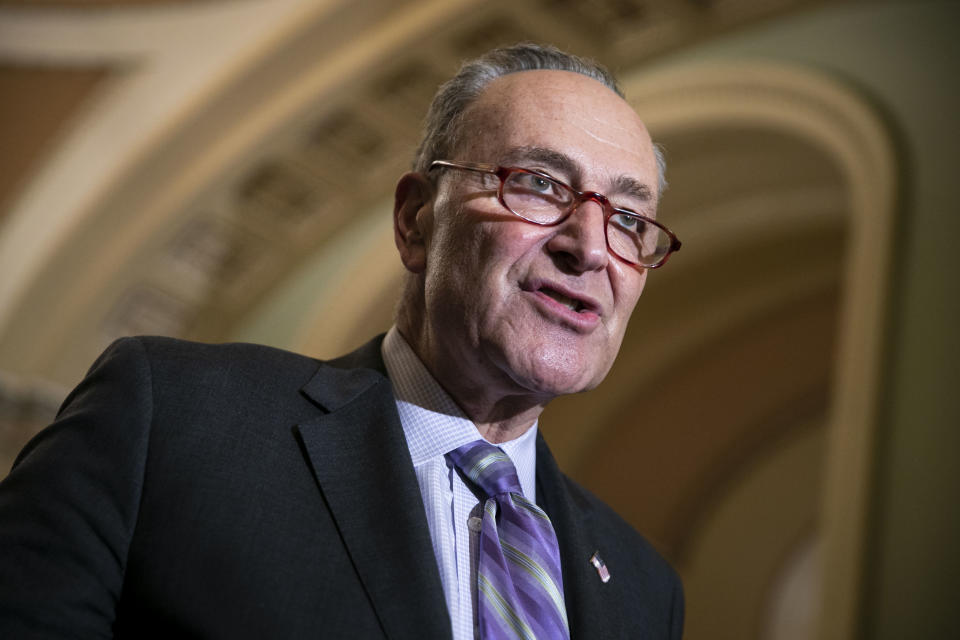Rubio wants 'preference' for corporate reinvestment over stock buybacks
Senators Bernie Sanders and Chuck Schumer are getting an unlikely ally in their fight against stock buybacks: GOP Senator Marco Rubio. But he proposes altering the tax treatment of buybacks as opposed to requiring companies to make investments into labor before repurchasing shares, as the Democrats propose.
Rubio released a report Tuesday criticizing U.S. companies for spending cash on repurchases instead of reinvesting the money into capital investment. The report bashed the five largest U.S. tech groups — especially Apple and Microsoft — for spending $228 billion on stock buybacks and dividends as the top five Chinese tech companies “ploughed the rest of their excess cash into investments that broaden their footprint and influence.”
Rubio warned that the difference in capital allocation puts the U.S. at a disadvantage.
“We do want to create a preference for reinvesting [capital] back into your business to increase productivity, innovation,” Rubio told Yahoo Finance on Wednesday.
Rubio told Yahoo Finance that he will “soon” offer legislation that would alter the way that some shareholders “defer” taxes so that investors pay the same capital gains tax as they would if they received a dividend.
The report comes as more liberal members of Capitol Hill also criticize companies for prioritizing stock buybacks over company investments like raising wages or hiring new workers for new projects. Last year was a record year for buybacks as U.S. companies — helped by the inflow of cash from the Trump tax cuts — funneled about $1 trillion into share repurchases. And although it is early in the calendar year, Bank of America Merrill Lynch said Tuesday that buyback activity is pacing 78% above last year’s levels, thanks to the financials and materials sectors.
Earlier this month, Sanders and Schumer wrote an opinion piece for The New York Times proposing new legislation that would bar a corporation from buying back its own stock unless it can prove its investments into its workforce. They suggest a $15 minimum wage and offering seven days of paid sick leave as criteria for allowing the buybacks.

“Why wouldn’t it be better for our national economy if, instead of buying back stock, corporations paid all of their workers better wages and provided good benefits?” the senators wrote.
The data is not so clear on whether buybacks actually crowd out investment. UBS analysts wrote in a note Feb. 5 that capital spending trends have been “sluggish” over the past several years but said they are more likely the result of other economic factors like uncertainty about the future.
‘Tinker with the tax code’
Rubio told Yahoo Finance that his plan to address stock buybacks is “not on the same page” as his Democratic colleagues, adding that the Sanders and Schumer proposal would “make it almost impossible” to carry out a share buyback.
“It should just be treated the same across the board, whether it’s through a dividend or an increase in the value of those shares through a stock buyback,” Rubio said.
But his proposal on eliminating buybacks’ “tax advantage over other forms of capital allocation,” as he described the original idea in a December tweet, is not so clear. Gregg Polsky, a taxation law professor at the University of Georgia, told Yahoo Finance that since 2003, buybacks and dividends have been taxed at the same long-term capital gains rate.
Where there is a difference — the treatment of those that choose not to participate in a stock buyback program. When a company decides to buy back stock, it allows shareholders to choose if they would like to sell their shares back to the company. Those that do will pay a tax on the capital gains from that sale. For those that do not sell their shares, they can “defer” the taxes by electing to cash out at a later date, which would make the effective tax rate they pay lower when accounting for the time value of money.
Although Rubio’s report does not describe the mechanics of his proposal, it cites a 1969 paper from Yale professor Marvin Chirelstein suggesting share repurchases be treated like dividends to both sellers and non-sellers for tax purposes. Under this framework, every shareholder receives a taxable dividend and those that elect to sell their shares back to company pay capital gains tax on their sale — in addition to a tax on the dividend that they received.
“That transaction is the same as giving a company-wide dividend to all shareholders and then having the redeemers sell their shares to the non-redeemers,” Polsky said of the Chirelstein proposal.
Rubio also wants to pair this change with a provision that would make certain business investment deductions from the Trump tax cuts permanent. The idea is that by making stock buybacks less attractive from a tax standpoint and giving companies more flexibility to write-down more capital expenses, companies will be more motivated to spend on capex instead of enriching shareholders.
But the Heritage Foundation’s Adam Michel said the odds of that being done in this gridlocked Washington are low.
“I don’t see anything happening in this Congress is that sort of general tax space,” Michel said.
Rubio told Yahoo Finance he is seeking “a little bit more input” on his proposal before he formally introduces legislation.
“Anytime you tinker with the tax code, it's complicated and we want to make sure that we can foresee all the potential, unintended consequences,” Rubio told Yahoo Finance.
Brian Cheung is a reporter covering the banking industry and the intersection of finance and policy for Yahoo Finance. You can follow him on Twitter @bcheungz.
Read more:
Newest Fed governor says current monetary policy 'in a good place'
Elizabeth Warren and Maxine Waters push back on BB&T, SunTrust merger
BB&T, SunTrust merger could spur domino effect of bank M&A
Consumer watchdog loosens Obama-era guardrails on payday lending
Congress may have accidentally freed nearly all banks from the Volcker Rule
